
As if the bone-chilling temperatures and the endless snow weren’t enough, winter 2014 will be felt well into spring.
According to allergy experts, the record-setting snowfall in some regions and the lingering below-freezing temperatures (parts of the Midwest and the East Coast enjoyed another dumping of the white stuff in this first week of spring) could mean a late flowering for trees. That means that once the temperatures do warm up, pollinating trees will be busy catching up, spewing higher than average amounts of sneeze- and sniffle-inducing allergens into the spring air.
VIDEO: What You Need To Know About The Polar Vortex
“If it warms up quickly, and gets really warm, that may mean everything starts pollinating all at once,” says Estelle Levetin, professor of biology at University of Tulsa. Generally, trees dump their allergy agents more gradually. March sees red cedars, elm, and pine trees start to bloom, followed by maple, ash, birch, and oak, and April sees the nut trees like pecan and walnut begin to pollinate in the South. Grasses and ragweed kick in later in the spring. But if spring is shortened, then that process will be telescoped into a few miserable weeks for allergy sufferers.
Then there’s all the moisture in the ground. Melting snow has made for muddy and moist soil, and spring rains will only add to puddles and the damp conditions of an already saturated ground. That could lead to more mold, and mold spores can trigger more respiratory problems related to both allergies and asthma. As long as there is moisture, mold can grow on almost any surface, from wood to soil and buildings, according to the Environmental Protection Agency.
MORE: You Can’t Hide From Allergies
There are a few things that allergy sufferers can do to reduce their symptoms, says Dr. Andrew Murphy, chief of allergy at Chester County Hospital of the University of Pennsylvania Health System. Starting nasal steroids early can help, since they take up to two weeks to calm the immune system’s reaction to allergens. Keeping windows and doors closed when the weather gets warmer is also important, to reduce the flow of pollen into your home. And taking a shower before going to bed can also lower the amount of pollen you’re exposed to.
More Must-Reads from TIME
- Donald Trump Is TIME's 2024 Person of the Year
- Why We Chose Trump as Person of the Year
- Is Intermittent Fasting Good or Bad for You?
- The 100 Must-Read Books of 2024
- The 20 Best Christmas TV Episodes
- Column: If Optimism Feels Ridiculous Now, Try Hope
- The Future of Climate Action Is Trade Policy
- Merle Bombardieri Is Helping People Make the Baby Decision
Contact us at letters@time.com